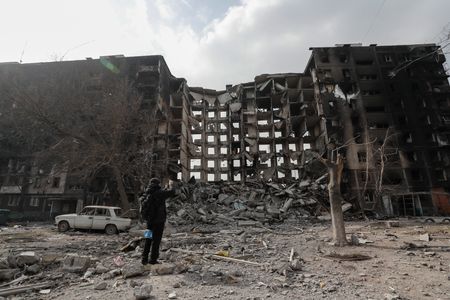
Mariupol a strategic prize for Russia, symbol of resistance for Ukraine

By Pavel Polityuk and Natalia Zinets
(Reuters) – The southern Ukrainian port of Mariupol has been under heavy fire from Russian forces since soon after the war began on Feb. 24.
Nearly 5,000 people have been killed and buildings across the city destroyed, according to the mayor. He said 290,000 people had fled by March 27 but that at least 160,000 were still trapped without power and with little food or other supplies.
Why is the city so important?
STRATEGIC LOCATION
Mariupol is the biggest Ukrainian city on the Sea of Azov, which is connected to the Black Sea by the narrow Kerch Strait. The city takes its name from Maria Feodorovna, the wife of Russian Emperor Alexander III, and lies about 70 km (43 miles) from the border with Russia. It is also a few kilometres from territories of eastern Ukraine controlled by Russia-backed separatists who have been fighting Ukrainian government forces since 2014.
Mariupol’s capture could enable Russia to create a land bridge between two separatist, self-proclaimed people’s republics in Donbas and the Crimea region which Russia seized and annexed in 2014.
Capturing Mariupol would also give Russia control of the Ukrainian coast on the Sea of Azov as it also tries to cut Ukraine off from the Black Sea. Russian forces have already seized the Black Sea port of Kherson about 380 km from Mariupol and Russia controls Crimea’s Black Sea ports. Losing Mariupol, and the establishment of a land corridor, could give Russian forces a chance to encircle Ukrainian troops that before the war were based on the line of contact around separatist-controlled territory.
Capturing Mariupol would free up Russian troops bogged down there for new duties such as reinforcing other fronts.
ECONOMIC ROLE
Mariupol is important role for Ukraine’s economy as the port is used to export iron, steel, grain and heavy machinery, a significant source of income for the Ukrainian government. It was traditionally a major export port for coal in Soviet times, when it was from 1948 until 1989 known as Zhdanov, after a communist leader who was born there.
A senior industry official said on March 21 that Ukraine faced a possible grain revenue loss of $6 billion because of Russia’s blockade of ports including Mariupol. Countries that rely on imports of Ukrainian wheat include Egypt, Turkey and Yemen. The war is contributing to global food inflation. Mariupol is also home to the Illich Iron and Steel Works, the second largest metallurgical enterprise in Ukraine, and to the Azovstal iron and steel works, one of the biggest steel rolling companies in the country.
Mariupol has deeper berths than other Ukrainian ports in the region. Controlling it could help Russia ship equipment, goods and personnel more quickly and easily between Russia, Donbas and Crimea.
DAVID AND GOLIATH
Mariupol has become a symbol of Ukrainian resistance, with leaders portraying the outgunned defenders as heroes fighting an uneven battle similar to the Biblical struggle between David and Goliath. Some foreign and Ukrainian leaders have compared the destruction in Mariupol to the devastation caused by Russian assaults on the Syrian city of Aleppo and Grozny in Russia’s restive Chechnya region.
Mariupol would be the first major Ukrainian city to fall to the Russian invaders. Losing it would be a potentially heavy psychological blow that dents Ukrainian morale. By contrast, it could lift the mood in Russia and be held up by President Vladimir Putin as an important victory in a war that Western military experts say has largely struggled to achieve its objectives.
Russia has vilified the Azov Battalion, a far-right militia that is part of Ukraine’s National Guard and has been helping defend Mariupol. One of the declared goals of Putin’s “special operation” was to “denazify” Ukraine. Western leaders say that was a baseless pretext for an unjustified war, but Putin would be likely to hold up a defeat of the Azov Battalion, or the capture of any if its fighters, as a milestone.

















POST COMMENTS (0)